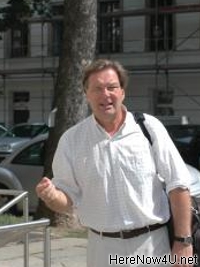
Centre of Jaina Studies Newsletter: SOAS - University of London
Jainism and Modernity, the 9th international Jaina Studies Workshop at SOAS was funded by the Centre for Jaina Studies and Lund University, two key members of the European Initiative for Cooperation on Jain Studies. Individual members of the Jain community, who all wish to remain anonymous, contributed as well. The theme of the workshop, Jainism and Modernity, attracted scholars from Europe, India, Japan and the USA with a broad array of interests, ranging from ritual performance, logic and mathematics to astronomy and law. It thus demonstrated the necessity felt by the scholarly community to relate Jain doctrine and practice to modernity by opening up new avenues of research within different academic disciplines.
This year, the organizers also had the great privilege of welcoming a most distinguished scholar of Jainism, Professor Lawrence A. Babb of Amherst College, who delivered the Annual Jain Lecture entitled Jainism and the Culture of Trade. In his learned and innovative lecture, he explored the relationship between economics, religion and social values within the Jain community of Jaipur by telling the story of the emerald trade, the foundation of Jaipur's renowned lapidary industry, and how it became intertwined with the lives of the Jains of Jaipur.


The workshop on the next day did not begin with a discussion of the concept of Jain modernism, a topic that Peter Flugel (SOAS) in his paper with the same title addressed by outlining the basic features and pre-history of Jain modernism as well as investigating "modernist" (self-) constructions of Jain history, doctrine and identity. Instead, all participants, including scholars, members of the Jain community as well as the general public, were cordially welcomed by the god of gods - Indra - joyfully dancing and with his eight arms inviting the assembled listeners. The fresco painting of Indra, depicted on the ceiling of the Indra Sabhā cave at Ellora, welcoming gods, humans and animals to the samavasarana, was shown by Olle Qvarnstrom (University of Lund) as an introduction to his and Niels Hammer's project on the Jain cave paintings at Ellora. This sub-theme of the workshop was continued by Lynn Foulston (University of Wales, Newport) who enlightened the audience with
text and illustrations of the last Mahāmastakābhiseka. Having enjoyed this account on Digambara Jain ritualism at Śravanabelagola, Maria Schetelich (University of Leipzig) presented her investigation into the archive of Johannes Hertel, located at Leipzig University and containing inter alia the correspondance with Jains in Benares and Patan, and its relevance for the history of Jainology. Sin Fujinaga (Myakonojo University, Japan) subsequently provided the participants at the workshop with a useful report on the current state of research on Jainism in Japan and its three phases, each being strongly affected by the social conditions in Japan and India. The remaining papers revolved around two themes: science and religion, and, modern economics and religion. An- upam Jain (Holkar Sciences College, Indore) and Prabha Jain (Prajna Prakarsha Samiti), holding a unique competence in both Jain religion and mathematics, elaborated upon the Jain contribution to modern mathematics and the Jain contributions to set theory and its application in Jain logical and epistemological texts, respectively. These papers were followed by a lecture by Kim Plofker (Brown University) on the links between Sanskrit and Muslim science in astronomical works. In her paper she argued that, compared to its Hindu-majority counterpart, the Jaina scientific tradition was in some ways more receptive to, and simultaneously more insulated from, the new and foreign ideas of early modern Indo-Islamic science. After that Jonardan Ganeri (University of Liverpool) delivered a fascinating paper on the 17th century Jaina philosopher Yaśovijaya Gani and the challenges that he faced due to the encounter between traditional Sanskrit discourse and the intellectual world of the Mughal Empire. Ganeri based his interpretation of Yaśovijaya's work on Nelson Goodman's theories. This was followed by Jayandra Soni (University of Marburg), who recently co-translated Walter Schubring's Worte Mahāvīras into English, reminding us of the fact that Jain philosophy not only derives from the teachings and practice of Mahāvīra, but has relevance even today. Manisha Sethi (Jaimia Millia Islamica, New Delhi), and Signe Kirde (University of Bonn) dealt in their presentations with "possession" in legal and ethical Jaina terms, respectively.
The cordial words of welcome by Professor Paul We- bley, Director of SOAS, and the inspiring remarks from the honorary guest, Bhattāraka Cārukīrti, elucidating the Mahāmastakābhiseka and various activities at the Matha of Mūdabidrī, made the Annual Jaina Studies Workshop at SOAS once again a most enjoyable and enlightening event. As customary, the workshop closed with a recitation of the Panca Namaskūra Mantra performed by Samanī Prasannaprajnā.




 Prof. Olle Qvarnström
Prof. Olle Qvarnström